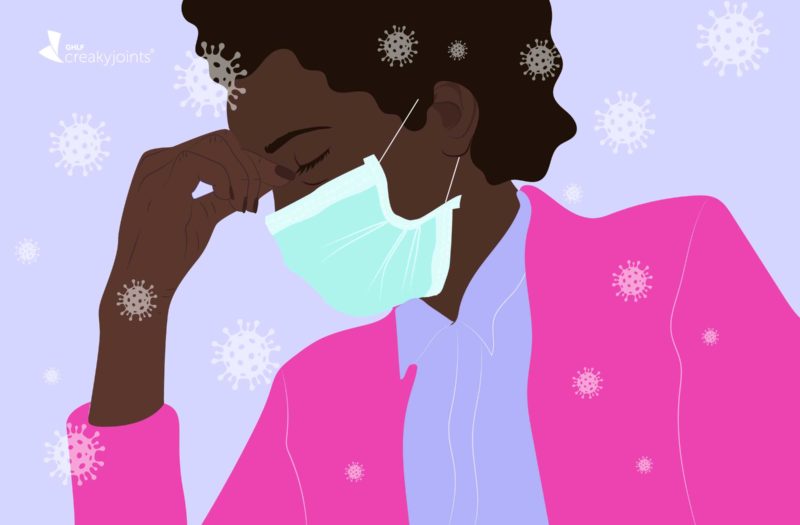Learn more about our FREE COVID-19 Patient Support Program for chronic illness patients and their loved ones.
A number of long-term side effects of COVID-19 have been reported since the start of the pandemic, but new research sheds light on how far-ranging these persistent symptoms can be — and the chronic illnesses they resemble.
In a preprint systematic review and meta-analysis posted January 30, 2021, researchers analyzed data from 47,910 patients with a confirmed COVID-19 diagnosis in 15 separate studies that had looked at symptoms, signs, or laboratory parameters two weeks or more after the infection. (A preprint means the study has not yet undergone peer review.)
The researchers identified 55 possible long-term effects from COVID-19. They estimated that 80 percent of the patients who were infected developed one or more long-term symptoms.
The five most common symptoms were:
- Fatigue (58%)
- Headache (44%)
- Attention disorder (27%)
- Hair loss (25%)
- Difficulty breathing (24%)
During follow-up, 34 percent of patients had an abnormal chest X-ray or CT scan. Researchers also identified several elevated markers in the blood, such as C-reactive protein — a marker of inflammation.
Each study had at least 100 patients, who ranged in age from 17 to 87, and with a follow-up period of 14 to 110 days.
“We have not analyzed the gender differences in our meta-analysis because not all the studies that were included made this differentiation, but a couple of studies reported that fatigue, post-activity polypnoea [rapid breathing], and alopecia [hair loss] were more common in women than in men,” says researcher Sonia Villapol, PhD, an Assistant Professor of Neurosurgery at Houston Methodist Research Institute.
The researchers also note that the symptoms observed in post-COVID-19 patients resemble in part chronic fatigue syndrome (CFS), which includes symptoms like severe debilitating fatigue, pain, neurocognitive disability (such as difficulty concentrating), sleep problems, and more.
“Possible causes of CFS include viruses, immune dysfunction, endocrine-metabolic dysfunction, and neuropsychiatric factors,” write the researchers. “The infectious agents related to CFS have been Epstein-Barr virus, cytomegalovirus, enterovirus, and herpesvirus. It is tempting to speculate that SARS-CoV-2 can be added to the viral agents’ list causing ME/CFS.”
In other words, the researchers think it’s possible that SARS-CoV-2, the virus that causes COVID-19, could be one of several viruses that could trigger chronic fatigue syndrome — but more research is needed.
The review also pointed out that adults have double the risk of being newly diagnosed with psychiatric disorder after a COVID-19 diagnosis. The most common were anxiety disorders, insomnia, and dementia. Sleep disturbances might contribute to psychiatric disorders, note the researchers.
When considering if anything in particular about the findings surprised her, Dr. Villapol says: “Without a doubt, the number of lingering neurological effects post-COVID.”
She adds that neurological diseases are the researchers’ main concern right now, especially in terms of how psychiatric illnesses like anxiety or depression can be treated — and also because inflammatory problems in the brain could trigger neurodegenerative diseases in the future.
Another January 2021 study published in The Lancet found that 76 percent of patients hospitalized with COVID-19 in Wuhan, China, reported at least one persisting symptom six months after symptom onset (with the proportion being higher in women), usually fatigue or muscle weakness and sleep difficulties. What’s more, 23 percent of patients reported anxiety or depression in follow-ups.
The researchers of the new preprint study note that physicians should be aware of the symptoms, signs, and biomarkers present in patients previously affected by COVID-19 in order to assess and try to halt long-hauler COVID-19 progression. More studies will be needed to understand the causes, mechanisms, and risks of these long-hauler symptoms to develop preventive measures and clinical management strategies.
In some cases, physical therapy, regular checkups, and cognitive behavioral therapy may be required to manage long-hauler symptoms of COVID-19.
“Long COVID is a multisystemic disease and can affect many organs,” says Dr. Villapol. “Therefore, recovery patients have to pay attention to each long COVID effect and visit a specialist immediately so these symptoms do not become chronic, which can happen if they last more than six months.”
Get Free Coronavirus Support for Chronic Illness Patients
Join the Global Healthy Living Foundation’s free COVID-19 Support Program for chronic illness patients and their families. We will be providing updated information, community support, and other resources tailored specifically to your health and safety. Join now.
Huang C, et al. 6-month consequences of COVID-19 in patients discharged from hospital: a cohort study. The Lancet. January 16, 2021. doi: https://doi.org/10.1016/S0140-6736(20)32656-8.
Interview with Sonia Villapol, PhD, an Assistant Professor of Neurosurgery at Houston Methodist Research Institute
Lopez-Leon S, et al. More than 50 Long-term effects of COVID-19: a systematic review and meta-analysis. medRxiv. January 30, 2021. doi: https://doi.org/10.1101/2021.01.27.21250617.






